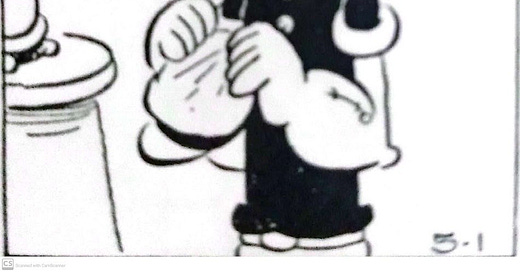A garland of quotations XLVII
Culled from the finest horshes in literary history, and re-woven every Wednesday
Of what use were wings to a man fast bound in chains of iron? They would but increase the horror of his despair.
•Adelbert von Chamisso, Peter Schlemihl (1813).
Happy were those who dwelt within the eye
Of the volcanoes…
•Byron, ”Darkness” (1816).
Spare Brahmins, good men, cows, truthful women, old men, children. Destroy evildoers.
•Ilangô Adigal, The Ankle Bracelet (171?).
They’s three things w’ich I loves most of all on this eart’ an’ tha’s this, wimen—chil’ren—dumb animals—widows—horshes, ol’ folks an’ spinach.
•E.C. Segar, Thimble Theater (5/1/1935).
Of all decades in our history, a wise man would choose the eighteen-fifties to be young in.
•G.M. Young, Victorian England: Portrait of an Age (1936).
Knowing that he could not carry them himself, but not wishing to leave them to be mutilated by the Turks and Arabs, Napoleon ordered Desgenettes to poison his hospital patients instead.
•Alan Schom, Napoleon Bonaparte (1997).
He was sorry to find that my principle of liberty extended in fine to a liberty from all principles.
•Earl of Shaftesbury, Characteristics of Men, Manners, Opinions, Times, etc., vol. II (1702).
A fig for all the inns in England; if we have a good tent over our heads we shall do well enough.
•Daniel Defoe, A Journal of the Plague Year (1722).
Who weeps because of winter, laughs because of the sun.
•Harry Kemp, ”Away from Town” (1914).
I…must say, as Ben Jonson did to Sylvester, who challenged him to rhyme with—
”I, John Sylvester,
Lay with your sister.”
Jonson answered, “I, Ben Jonson, lay with your wife.” Sylvester answered, “That is not rhyme.”—“No,” said Ben Jonson; ‘“but it is true.”
•Byron, footnote to Don Juan I (1819).
References: Ilangô Adigal: trans. Alain Daniélou, Shilappadikaram (The Ankle Bracelet) (New Directions, 1965); Kemp: The Cry of Youth (Kennerly, 1914); some of this material is copyrighted, and I plead only fair use.




